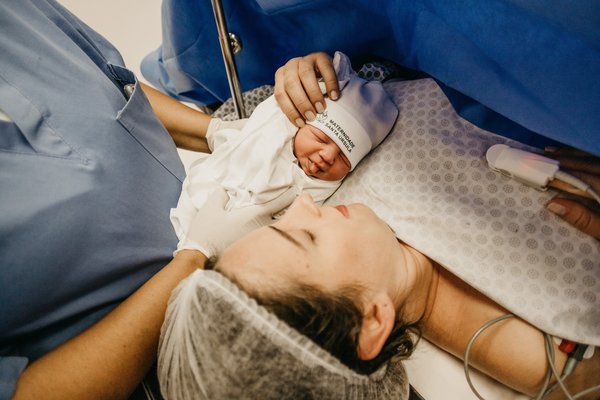The type of anesthesia a woman receives during a cesarean delivery can play a big role in reducing her risk for postpartum depression, new research suggests.
Regional anesthesia may be better for a new mom's mental health, according to a study published in the journal Anesthesia and Analgesia.
Researchers from Columbia University found that general anesthesia increased the risk of postpartum depression by 54% compared to regional anesthesia. It also increased the likelihood of having suicidal thoughts by 91%.
- MORE HEALTH
- PTSD symptoms may take years to appear – here's how to recognize them
- Hospital-based breastfeeding initiatives reduce early infant deaths
- U.S. birth rate at lowest level in more than 30 years, CDC says
Postpartum depression is a mood disorder that can develop in women after giving birth. About 80% of women experience "the baby blues" within the first few weeks after giving birth, according to Anxiety and Depression Association of America. About 13% will experience the more severe symptoms of postpartum depression, including extreme sadness, anxiety, exhaustion, feelings of hopelessness and suicidal thoughts.
Previous research found links between the use of general anesthesia during surgery and an increased risk of postoperative depressive disorders. But this is the first study to focus on postpartum depression after a cesarean delivery.
"General anesthesia for cesarean delivery may increase the risk of postpartum depression because it delays the initiation of mother to infant skin-to-skin interaction and breastfeeding, and often results in more acute and persistent postpartum pain," Dr. Jean Guglielminotti, an anesthesiology professor at Columbia, said in a statement.
While general anesthesia can be a quicker option in the case of an emergency delivery, there has been no evidence that it improves outcomes for the baby, researchers said.
"Our findings underscore the need to avoid using general anesthesia for cesarean delivery whenever possible, and to provide mental health screening, counseling and other follow-up services to obstetric patients exposed to general anesthesia," Dr. Guohua Li, Finster Professor of Epidemiology and Anesthesiology said.
Researchers reviewed hospital discharge records of 428,204 cesarean delivery cases performed at New York State hospitals between 2006 and 2013. Of these, 34,356 women – 8% – were given general anesthesia.
Researchers found that 1,158 of the study participants experienced postpartum depression. More than half of them were diagnosed after being readmitted to the hospital within 164 days of discharge.


